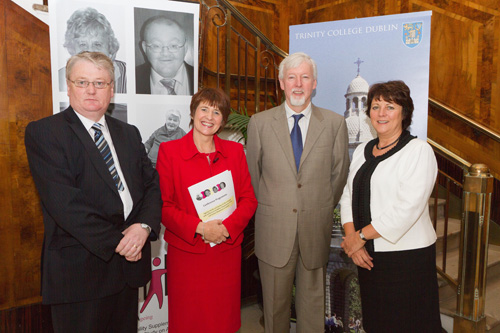TCD School of Nursing Hosts International Conference on Ageing and Intellectual Disability
Posted on: 01 October 2010
The first international conference on ageing and intellectual disability organised as part of the landmark study, the Intellectual Disability Supplement to The Irish Longitudinal Study on Ageing (IDS-TILDA) which is being carried out by Trinity College Dublin, was held in Trinity’s School of Nursing and Midwifery recently. The conference, which featured a host of renowned speakers from across the disability and ageing sectors, provided a platform for national and international exchange, helping to bridge the policy and practice gap between both sectors.
Similar to other developed countries, Ireland has witnessed a marked increase in longevity in persons with intellectual disability over the past fifty years. The Intellectual Disability Supplement to TILDA, led by Head of the School of Nursing and Midwifery at TCD Professor Mary McCarron, commenced in November 2009 and involves approximately 800 people with intellectual disability aged 40 years and over, charting their health, social, economic, environmental and psychological status as they age over at least a 10 year period.

Minister John Moloney, Professor Mary McCarron, Provost Dr John Hegarty and Minister Aine Brady at the conference.
Preliminary findings from an initial cohort of 230 people suggest relatively low levels of most disease conditions but rates of obesity, low levels of physical activity and high cholesterol will likely result in health challenges as will reported high levels of epilepsy, constipation and medication use. An increasing concern were the high levels of mental health problems with over 55% of the population studied citing loneliness and reported difficulties in making friends outside the home. Speaking about the initial findings Professor McCarron said: “This is a population that appears to control their day but not their lives in terms of where they live and who they live with.”
Minister for Equality, Disability and Mental Health, John Moloney, speaking at the conference welcomed the IDS as advancing the National Disability Strategy 2004 which aims to underpin the participation of people with disabilities in society: “The data derived from IDS -TILDA will form a central plank in a better awareness of the issues specific to ageing with an intellectual disability and will, therefore, enable a better tailoring of policies and programmes for older people so that they can be enabled to live and participate fully in community life”.
Also speaking at the conference Minister for Older People and Health Promotion, Aine Brady, referred to the study as critical to informing action plans resulting from the National Positive Ageing Strategy due to be published this autumn, ensuring that the needs and desires of people with intellectual disability as they age are also included. She said: “We are currently at a very important juncture in the lives of older people in Ireland. We must respond to the challenges posed by an ageing society by consulting with older people and by adopting an evidence-based approach to service planning and delivery to ensure the best quality of life for all older people now and into the future. By hearing the voices of older people through TILDA and IDS-TILDA we will be able to make an enormous contribution in this regard.”
More information on TILDA can be found via the website.
